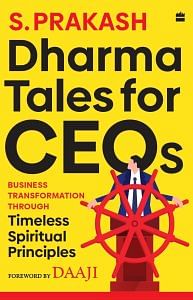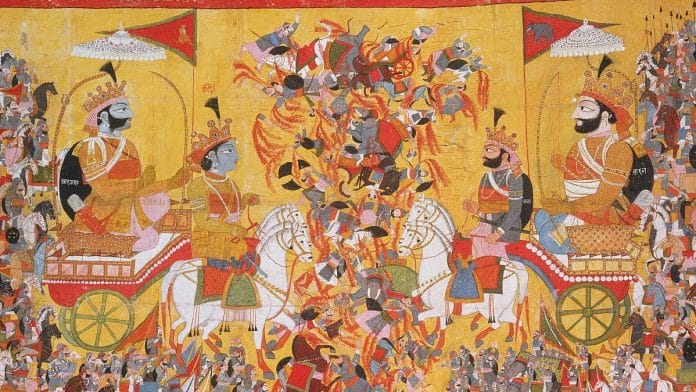Now, I’ll share one of my favourite stories from the Mahabharata—how will Dharma, that is Yudhishthira, respond in a life-or-death situation that will test all his skills?
The story takes place towards the end of the twelfth year of the Pandavas’ exile, with one more year of agyatvasa (living incognito) coming up soon.
The Pandavas are sitting and talking at the edge of the forest, when a priest arrives and requests help. He says an antlered deer has taken away the wooden blocks he uses to light a fire, and so, he can’t begin his rituals. Yudhishthira, true to his benevolent, kingly nature, agrees to help.
The Pandavas set out into the forest to find the deer, but after chasing success for a long time, they get tired and thirsty. They find a place to rest, and Yudhishthira asks Nakula to find some drinking water. Nakula goes into the forest, and finds a pond. But before he can get water from it, a stork rises from the centre of the pond and starts speaking to him. ‘O Nakula, please answer my questions before you can take water from the pond, else you will be dead.’
Nakula laughs recklessly, thinking what can a bird do to him? He takes the water for his brothers, and drinks some himself. But as soon as he drinks the water, he drops dead; the water is poisonous.
When Nakula doesn’t return for a long time, Yudhishthira sends his twin brother Sahadeva after him. Sahadeva arrives at the pond and is baffled to find his brother dead. He also goes to take the water, but drops dead too when he refuses to answer the stork’s questions and drinks the water. Arjuna and Bhima also arrive and meet the same fate.
With none of his brothers returning, Yudhishthira goes looking for them, and finds them all dead by the pond. He doesn’t know what befell them, but then, the stork appears and begins talking to him. When the stork tells him to answer its questions, Yudhishthira realizes it holds the clues to his brothers’ deaths. So, he agrees to answer the questions, and the creature takes into its true form—a yaksha (nature spirit).
The yaksha poses about 125 questions on philosophy, many dharmic concepts and values, gods, etc. You can look them all up if you want, but there is one question that assumed the greatest importance, and came to be known as ‘Yaksha Prashna’.
‘What is the strangest thing in this world?’ the yaksha asks.
Yudhishthira responds: ‘The strangest thing is that people around us are falling dead all the time, and yet man thinks he’s going to live eternally.’
The yaksha is pleased with Yudhishthira’s answers, and says, ‘my hands are now bound to dharma’. But it adds that it can only resurrect one of his brothers, so he has to make a choice. Yudhishthira thinks for a while and says, ‘please resurrect Nakula’.
The yaksha is surprised that even though there is an impending war, Yudhishthira isn’t choosing the strongest warriors in Bhima or Arjuna. It asks: ‘Would you mind telling me what made you choose Nakula?’
Yudhishthira says: ‘The name which I stand for, Dharma, is what made me choose him, because I am born of Kunti and so are Bhima and Arjuna, whereas Nakula and Sahadeva are born of my stepmother Madri. There has to be a balance in the family. Thus, I chose Nakula, so that his mother, in her memory, would have a son who lives on.’
The yaksha is so happy with the answer that he now reveals himself as Yama, the god of death, and Yudhishthira’s father. He was also disguised as the deer which took away the wooden blocks in its antlers.
‘I am so happy with the choice you made, because you have established exactly what dharma stands for,’ Yama says, and brings all the Pandavas back to life. He also blesses them and assures that on their one-year agyatvasa, he will protect them and ensure they aren’t found by the Kauravas.
Also read: Amar Chitra Katha promises to make history fun. It pushes upper-caste middle-class hegemony
How the Tale Connects to the Corporate World
This story provides profound insights into the essence of dharma, the personification of which is Yudhishthira. Whether you’re a sibling, a family member, a corporate executive, a national leader or someone heading a political or religious organization, what dharma will you uphold? What did dharma signify in this context? What choices did Yudhishthira have? How did he, in awfully challenging circumstances, find what seems to be the middle path? He would have had the urge to engage in conflict, and he also possessed considerable power. Yet, Yudhishthira followed obedience when he entered the realm of the yaksha, respecting its rules, and answered its questions patiently. This tale introduces various dimensions of inquiry related to administration, leadership and the values one must uphold. It presents a series of values and dharma that Yudhishthira skillfully demonstrated, which are pivotal in upholding the fabric of dharma. Upholding dharma necessitates strong people skills and empathy. Yudhishthira chose people over power, a decision that ultimately restored his authority and aided him in winning the war. His act of choosing his stepbrother Nakula over the stronger Bhima or Arjuna illustrates his empathy and remarkable people skills.
The tale of the Yaksha Prashna imparts a valuable lesson to leaders of all types, even in contemporary times. It underscores that leaders must possess wisdom and fairness, and consistently act in accordance with dharma. It also underscores the importance of quick thinking, and the ability to make tough decisions for leaders.
There are three key lessons that leaders can readily take away from this story:
Wisdom: Yudhishthira’s ability to provide accurate answers to the challenging questions posed by the yaksha showcases his understanding of what is just. In real life, followers also want their leaders to be equitable and just.
Impartial justice: Followers expect their leaders to exhibit the same fairness Yudhishthira did in his equitable and impartial approach. He did not resort to deception or manipulation; he was willing to accept the outcomes without showing any partiality or emotion.
 This excerpt from ‘Dharma Tales for CEOs: Business Transformation Through Timeless Spiritual Principles’ by S Prakash has been published with permission from HarperCollins India.
This excerpt from ‘Dharma Tales for CEOs: Business Transformation Through Timeless Spiritual Principles’ by S Prakash has been published with permission from HarperCollins India.






